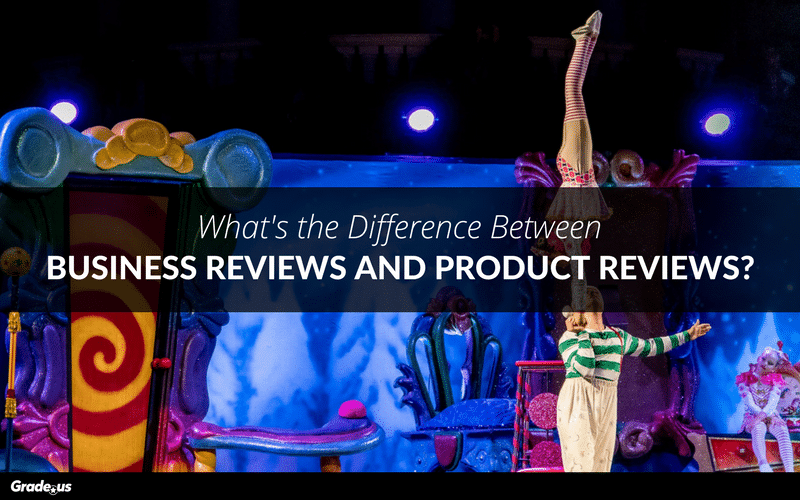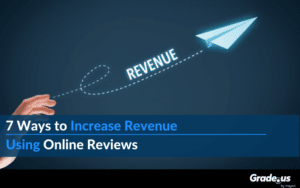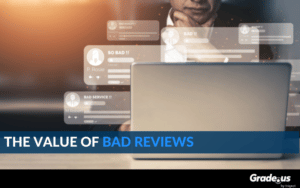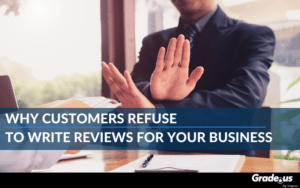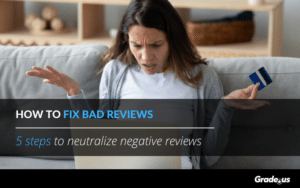Picture this.
You've just received a slew of negative reviews from some very unhappy customers. They're really angry because they feel your product has failed to meet their expectations. They leave scathing reviews on various 3rd party websites.
Afterwards, they decide to reward you. By buying more of your products and services.
Wait, what?
You read that right. You've created a product that's failed to meet customer expectations, so they do the rational thing. They reward you by giving you more money.
This response seems crazy but it's rational (and true)
This happens every single day.
A company makes a major mistake. Customers respond negatively. Then, a short time later, these same customers reward the offending company with even more business.
This scenario happens everyday, but it doesn't happen everywhere. It's actually rare, which is pretty obvious, right? Negative reviews are bad nine times out of ten. They're a disaster for most companies. Get enough of them and customers disappear, usually for good.
So what makes these companies, these anomalies, so special?
They understand the difference between business reviews and product reviews.
It's something that's glossed over. A review is a review right? Most organizations aren't aware of the significance between these two types of reviews. It's actually not their fault.
The mistake with business and product reviews is that they're used interchangeably. What's worse, they're often in the same review. A customer will spend a portion of their time focused on the product and how it performed, subtly shifting their focus to discuss the business itself.
Some customers move back and forth between the two.
Are the differences between business and product reviews that important?
They are, believe it or not.
These two types of reviews provide customers with data. Everything they need to make an informed decision about your business and your product.
Obvious, right?
This prompts savvy sellers to ask questions. What specifically are customers looking for? How do I give them what they want and what they need?
But it's more than that. These types of reviews give customers peace of mind. The protection they need from buyer's remorse.
It's really about risk management.
Business and product reviews give new customers the information they need to calculate risk. Customers are looking for non-negotiable anchor points and red flags.
· Character of business vs. performance of product. Customers want to know they'll be taken care of by the company (e.g. management and employees) they choose to work with. They also want to see that your product works as intended/expected.
· Are company values reflected in the product? Customers want to see that (a.) your brand values are in line with their brand values and (b.) your entire business, product lines, logistics, etc. exemplify and are oriented around these values.
· Crisis management vs. crisis avoidance. Customers read through reviews, looking for clues on product reliability. Is your product reliable or does it break after one or two uses? Okay, your product is reliable, what about your business? What happens when something goes wrong? Are you looking for a way out or a way to make things right?
· Logistics vs. non-logistics. Every sale has a mix of logistical and non-logistical questions.
Logistics: What's the warranty on this? How much does this cost? Can I pay monthly?
Non-logistics: What makes this product so different from competitors? Will this work for me? What's your process? What happens if I run into...
· Fulfillment + satisfaction. Research shows happiness is more about loss aversion and less about achievement. As people, we're more motivated by loss than we are by accomplishments. Customers are satisfied when they see your product is the solution they were looking for. They're fulfilled when a deep desire or need has been met.
Can you see a difference here?
Business reviews are about who you are, what makes you unique and what you've done or will do.
Product reviews are more specific. Does it work, were there problems, did it meet your expectations, etc.
Business reviews are about identity and purpose, product reviews are about performance and outcomes.
When customers are evaluating your business they're looking for answers to both.
Start Earning Business Reviews Today!
Sign up for the 14 Day Grade.us Free Trial and take our review generation platform for a spin.
FREE TRIALYou're a phony, a hypocrite, right?
Often times, it's a customer's subconscious (and automatic) assumption.
About you.
Why? Customers these days are jaded and disillusioned. They've been burned before. They know how the game is played. They're keenly aware of the fact that many companies will say or do anything to win their business.
They're disgusted by it.
It's tough for them to differentiate between companies. Are you a business that practices what you preach? Or are you saying whatever you have to say in order win my business?
It's a common problem.
Let's look at a few examples.
#1: Renown surgeon burns his patients insides

Simon Bramhall, a renowned liver, spleen and pancreas surgeon, was known as a lifesaver. He rose to prominence in 2010, when he successfully transplanted a liver that was saved from a burning aircraft. He was known as a consummate professional, a doctor who cared deeply about his work and his patients.
Until he was caught burning his initials "SB" into the livers of patients.
He was suspended from his position at Birmingham’s Queen Elizabeth hospital and he would resign a year later. The hospital's website states they offer "best in care." Are new customers more or less likely to believe them?
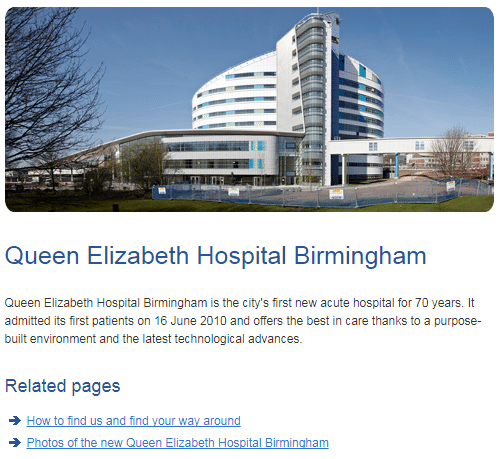
#2: Unilever struggles with marketing schizophrenia
Unilever is the parent company of Dove. Their campaign for real beauty made headlines and garnered a significant amount of praise. Customers were touched by their message of acceptance, that women are beautiful as they are.
Their advertisement is touching and heartbreaking all at the same time. Unilever takes things a step further creating the Dove Real Beauty Pledge.
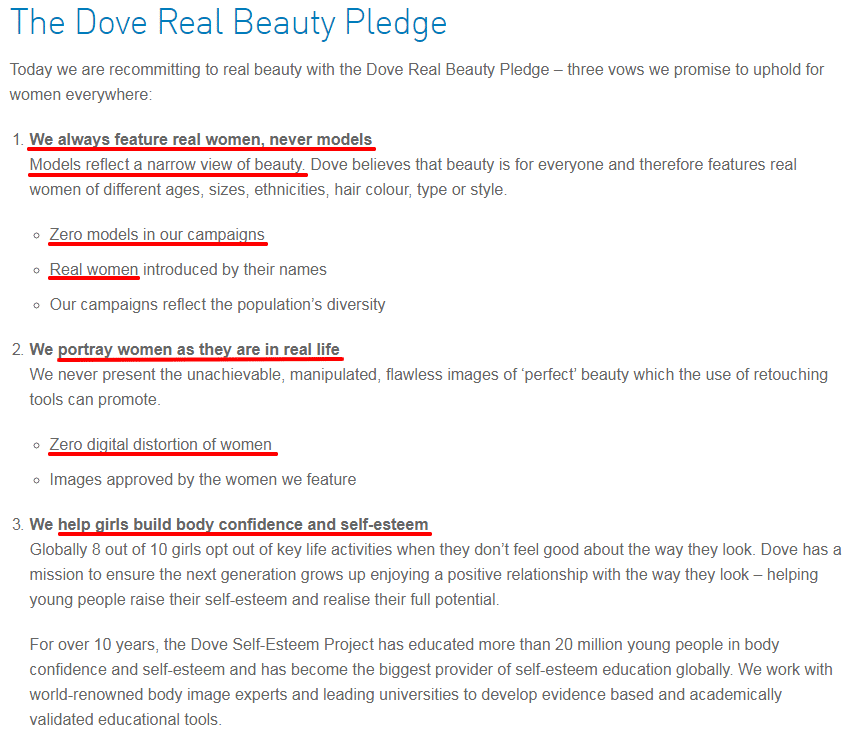
Amazing right? Until you see the ads for Axe, another Unilever brand.
The sad part? These ads are routine. Are Unilever's values suddenly not as important?
#3: The Burberry brand lies to customers

Burberry is a luxury brand that's known internationally, it's roots are in Britain. Their appeal is strongest in Britain. So, it makes sense then that they'd focus on keeping their customers at home happy. That was their intention when they announced their high quality products were "Made in Britain." They focused on the "Britishness" of their products.
It's a lie unfortunately.
The company closed all but two of their factories in Britain. They shipped production to China, which on its own, isn't really a bad thing. The problem here is the fact that Burberry continued to state their products where "Made in Britain."
Here's the thing.
This behavior isn't a fluke. Businesses lie to customers over and over and over. It's part of the reason customers are so motivated to minimize risk. Business and product reviews enable customers to do that in a way that's safe, efficient and low key.
Customers become entitled monsters...
Because they have to be.
Customers know they'll be taken for a ride if they're not on guard. They're worried about privacy, scams and fraud. They're worried about getting tricked into buying a product that doesn't work and won't produce results.
They're terrified. And they have every reason to be.
Choosing a company or product that fails to deliver means...
· Humiliation and embarrassment from family, friends and colleagues. "How could you be so stupid? Why would you think that would work?"
· A loss of status or reputational damage. "Oh you know Jan. She's a sucker for a good salesman."
· Career damage/destruction. You recommend an agency. Agency does a terrible job. You lose your job/career.
· Financial harm/loss. Customers choose the wrong product, blowing their budget. Now they have no money and no solution.
· Lost time and missed opportunities. Your customer needs your product at a specific time, for a specific event. A birthday gift that needs to be delivered early/on time. An upcoming product launch that can't be delayed. A special event that can't be rescheduled.
These aren't the only downsides of course.
But they do make the point. There's a lot at stake here. It's not unusual to see customers turn into entitled monsters who are difficult to please. Most aren't doing it to be malicious. They're doing it because they have to protect themselves.
Which is where reviews come in.
Your business and product reviews help customers separate the wheat from the chaff. Giving customers the information they need, means they're far more likely to choose your business.
Obviously.
That's not the problem though. The problem is specifics. What specifically are customers looking to get from each type of review?
Business reviews
· Identity. Collectively, what do customers say about you? What do they believe about your organization?
· Character. Are you the kind of company that tells the truth when it hurts? Do you deny, avoid and evade? Or do you embrace reality as it comes?
· Uniqueness. What's the one valuable thing you offer customers that they can only get from you?
· Culture. Are you a low or high power distance company? Do you trust your customers and your employees?
· Core values. What are the fundamental beliefs of your organization? How do you feel about your customers and employees? About your values in particular?
· Sentiment (positive or negative) from customers, competitors, suppliers or the marketplace? Is your organization seen as honorable?
Product reviews
· Sentiment (positive or negative) from customers, competitors, marketplace, etc.
· Social proof via the unbiased third parties who've shared their experience openly and honestly.
· Metrics. Customers are hungry for details on performance timeframes, outcomes, levels of completeness, and results. They're looking for indicators that show things have gone well for your customers.
· Objections. What went wrong, competency deficiencies, red flags, etc. Did customers bring any fears, frustrations or baggage in the relationship? How was it handled?
· Satisfaction levels. Are customers happy/satisfied overall? Is this company a diamond in the rough? Or an organization to avoid.
Let's look at a few examples.
Product Review: Dyson 360 Eye Robot Vacuum
Dyson creates amazing vacuum cleaners. Their reputation is well earned but their robot vacuum cleaner seems to be off to a rocky start. Customers who purchased the 360 Eye Robot Vacuum are unhappy.

- Sentiment: poor
- Social proof via Amazon customer
- Metrics: unable to navigate complex terrain
- Objections: The vacuum gets stuck constantly. It failed to complete a single cleaning.
- Satisfaction levels: unhappy (obviously)
Product Review: Dyson Ball Allergy Vacuum
The Dyson Ball is a flagship product. It's a product most customers are happy with and its reputation is well earned.
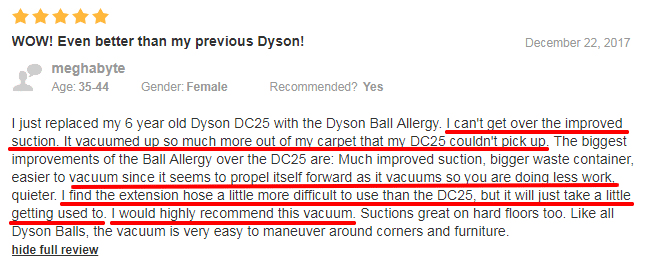
- Sentiment: pleased
- Social proof via Dyson direct customer
- Metrics: improved suction, propulsion, bigger waste container
- Objections: extension hose is a little harder to use than the DC25
- Satisfaction levels: happy
Here's the interesting thing about product reviews. Even if it's bad news, it's good news to know.
What about a business review?
Business Review: Dyson Ltd.
How does Dyson as a company do? How do customers feel about their products?
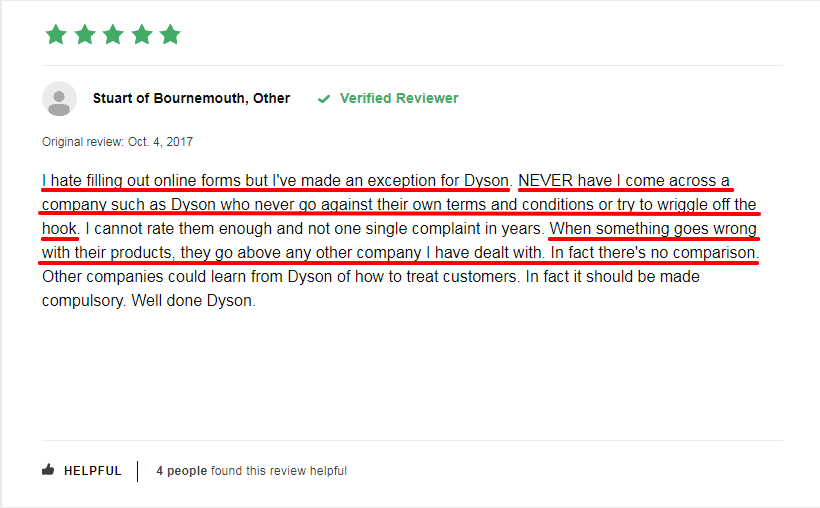
- Identity. Non-traditional. Dyson does things differently than their competitors.
- Character. Go above and beyond for the customer.
- Uniqueness. A Dyson vacuum is the only vacuum that doesn’t lose suction.
- Culture. An engineering culture that’s focused on expertise.
- Core values. Dyson values honesty. They can be trusted to keep their word.
- Sentiment (overall) Happy.
See the difference?
These types of reviews are important because it gives customers a clear picture of the kind of organization they're dealing with. This is the data your customers are looking for.
This is how they reduce risk.
Do customers see you as risky?
The vast majority of businesses have little to no reviews. That's a serious risk. A few companies have nothing but five star reviews. The absence of negative reviews strikes many customers as suspicious and risky.
A ratio of five positive reviews for every negative review is safe.
Negative reviews act as a filter, weeding out customers who aren't a good fit for your business. Business reviews attract customers who are a good fit for your organization. Product reviews reassure customers - an objective third party says you've provided value.
Here's the problem.
We've only looked at products so far. What about services?
A service review has the unfortunate effect of rising to the level of a business review. Business reviews are about identity and purpose, product reviews are about performance and outcomes.
An SEO agency that doesn't understand SEO. A restaurant with horrible tasting food. A doctor that kills his patients.
These services are all kind of worthless, right? What's worse, with each of these examples an argument can be made against the business itself.
Believe it or not this is good news.
A positive review for your service business functions as both a business and service review. The better you are at your work, the more positive your reviews will be.
The downside? It's a two-edged sword.
If your organization is terrible, if your service is awful, it becomes the identity of your business. It becomes a core part of your organization's reputation, an attribute that's difficult to shake.
Sometimes though, it doesn't matter. How do I know?
Amazon.
Amazon is a beloved company. Or, are they? Consumer Affairs is filled with thousands and thousands of angry customers. Customers who feel betrayed or cheated by Amazon.
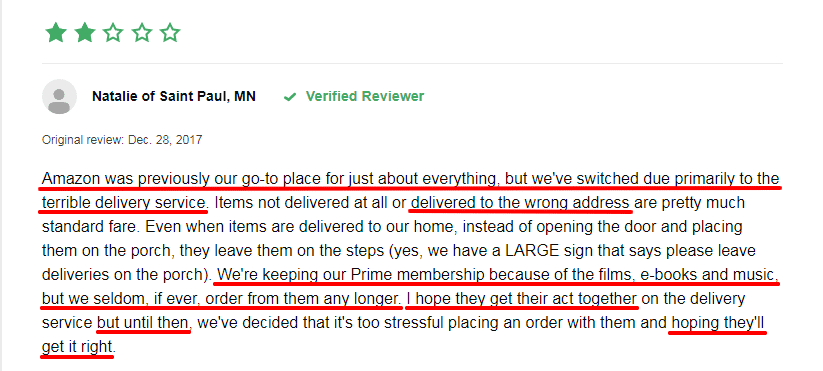
See what I mean?
This customer is unhappy, but they've repeatedly ordered from Amazon and experienced disappointment. In fact, this customers says they'll continue to (a.) pay for their Prime membership ($99 per year) and (b.) continue to order if they have to. They're holding out hope that Amazon turns things around and they're more than willing to come back when Amazon gets it right.
They can get away with it.
Big companies, beloved companies, companies with a long history of excellence - they all get away with it. But only in the short term. Once customers realize things won't change they leave, never to return.
These customers seem crazy, but they're completely rational
Amazon receives thousands of negative reviews. A customer's rational response is to spend more. Amazon's developed a strong relationship with these customers. They're embedded in our lives. These customers will continue to buy, even if the reviews are negative.
For now.
You're not a behemoth like Amazon, not yet.
But you can be. You understand the value of business and product reviews. You see the interplay between identity and purpose, performance and outcomes. Customers are afraid. They understand the risks that come with buying a product or service.
You do too.
But you're safe. How do I know? You have the magic ratio - five positive reviews for every negative review. Create the right mix of business and product reviews and you'll paint the picture your customers are looking for.
About the Author
Andrew McDermott
Andrew McDermott is the co-founder of HooktoWin. He shows entrepreneurs how to attract and win new customers.
Start Earning Business Reviews Today!
Sign up for the 14 Day Grade.us Free Trial and take our review generation platform for a spin.
FREE TRIAL
